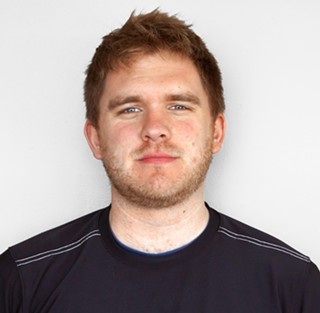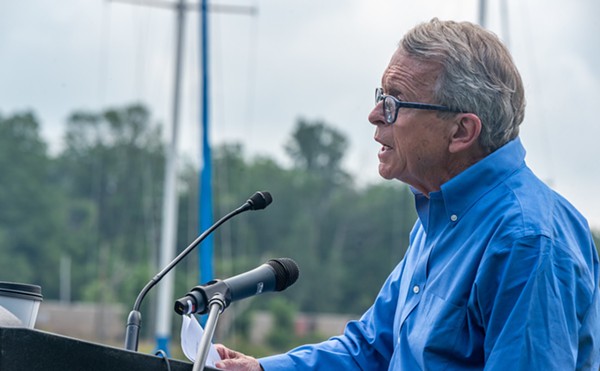Phil Trexler is one of northeast Ohio's best reporters, having covered crime and courts for the Akron Beacon Journal for the past 16 years (and the News-Herald for seven years before that). Earlier this month, Trexler left the ABJ to become an executive producer for WKYC, teaming up with Cleveland TV news legend "The Investigator," Tom Meyer. We caught up with Trexler about leaving print for Channel 3 back in his hometown of Cleveland.
What led to you becoming an executive producer over at WKYC?
They contacted me back in March about the opening, gauged my interest in it, and I came in and met with them. I was pretty overwhelmed by the reception it got here. Everybody here is really top notch and real professional and really dedicated to the type of journalism we need to perform going forward.
The TV news world is so foreign to me. What's the difference between it and print?
It was foreign to me too, to some degree. Initially, I didn't think there was a chance that I would make the transition. It was never anything that I really considered in the past, but looking into the future -- five, ten years down the road -- I thought that this would present a lot of great opportunities. We're doing the same type of journalism, just in a different format, a different frame. On the website, we're all doing the same whether it's print or TV or radio -- you still have a website. But I think us in print have this sort of arrogance when it comes to TV news, that we in print to do it better and with more depth. But it was eye opening when I came here to see the amount of work that goes in to producing just a two to three minute news piece. I spent way more time doing the story we ran Monday on state spending -- spent way more time on that than I had on a news story in print. There's a lot of components that go into producing TV news segments. A lot of what we're doing here is the same as what I was doing in print, but a lot of it is way different.
What are you spending your time on now?
Like we're doing now, you can pick up a phone and do an interview, but in TV you can't. Everything is visual, so it requires in-person interviews. It requires a lot of steps that go into putting together a package for TV that I never even considered. There's the writing portion, but there's also the reporting portion, and then there's the technical aspect of editing the package making sure what the viewers are seeing match with what you're writing. I'm still new at it so it's taking me longer. to do some of those things. There's just many more steps in the process. Even to me, it's exciting, fun and different, but I'm still doing what I've always done.
Yeah, when I heard you were going to be a producer for WKYC, I realized I had no idea what a producer does or what really goes on behind the scenes. Are you ever going to be on camera?
There was some talk about that during the interview process for down the road. But Tom Meyer, he's the guy that goes on TV and I'm the guy who goes in the background. It's a possibility but that's not why I came here. I'm a print guy for a reason. That's not my goal, my goal is to be a reporter, and I'm doing that here. And I'm basically coming home, because I'm a Cleveland guy. And I get the opportunity to come at a time where things are really developing here in terms of news: The Tamir Rice case, the Brelo case, I'm getting thrown right into that; and I interviewed the family of Tim Russell this week. It's a great time to be a journalist in Cleveland.
But at the same time, there's a lot back in Akron, with the mayor feuding with your old paper on his way out. What do you make of that whole thing?
It's pretty typical behavior, I think, of the mayor. It's amazing that after so many years, you'd think that not only would he have a thicker skin, but be above this act, more like a statesman with more dignity. But for him to go out the way he did, it's typical of him and not surprising, I think it's kind of sad that this is what it's come to. It's going to be his legacy now, that he got into a tiff with the local newspaper -- which, by the way, I think has been pretty supportive of his work in Akron. I think it's going to detract from some of the great work he's done there.
So in all your years of reporting in Akron, what story that you reported are you going to remember most?
Probably the work that we've done on Akron police officer Don Schismenos. It got a lot of results. He was a police officer who was going around recording people without authorization, recording people and his coworkers covertly, and the fact that he withheld his evidence and failed to provide it through discovery. The work that we did to expose not only the recordings but the conduct and his behavior -- we were able to take a bad cop off the street, so I'm pleased about that. Some folks have had their cases dismissed as a result of that. But 16 years in Akron, there are some great people there, and the newsroom was my home and it certainly was a difficult choice to leave there, but I had to do what's best for me and my family and Channel 3 is a great opportunity for us.
And now you'll be doing most of your stories partnered with "The Investigator," Tom Meyer?
Yup.
Had you known him prior to this?
No, I had actually never met him. They contacted me and then we had six weeks of contact before we finalized everything.
What kind of guy is he like off camera?
He's very hard working, that's what impresses me. He's been here since 1979, and he still does not mail it in, he's still hard working and intrepid, and I respect him. From a TV perspective, I can learn an awful lot from him and at the same time I can provide him with a newspaper perspective and a fresh set of ideas and ways to go. I look at it as a strong partnership, where I can help him and he can help me. But that's what impresses me, his work ethic as still as strong as it was in the 1980s when he came to Cleveland.
You also teach (news writing) at Kent State's journalism school. What do you think the kinds of careers journalism students will have in the future?
I tell my students you don't get in this business to make a lot of money. You get in this business because it's the type of work that you love to do. It's actually fun, so it's not like lifting heavy boxes, there's something new every day. That's what I tell them: If you want to do this, you can succeed in it. You need to be mobile, you need to be able to do a whole lot of different aspects of it -- video, web, writing. I don't discourage them to do it, I tell them it's a different type of world that journalists find themselves in, but there are opportunities out there. Journalism is far from dead.














